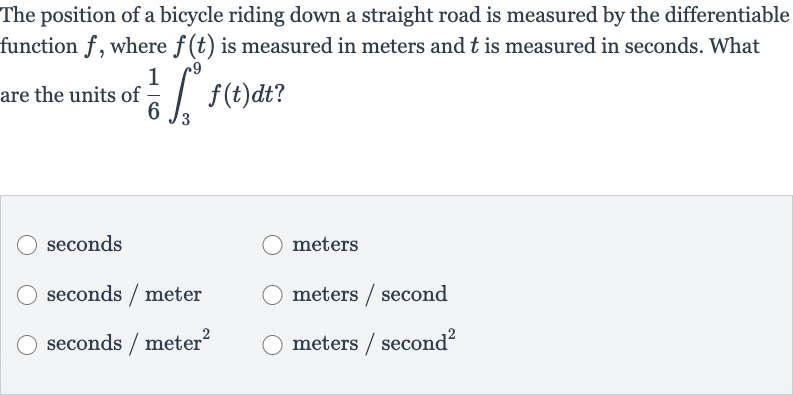AI tutor
Welcome to Bytelearn!
Let’s check out your problem:

The position of a bicycle riding down a straight road is measured by the differentiable function , where is measured in meters and is measured in seconds. What are the units of ?secondsmetersseconds / metermeters / secondseconds meter meters / second
Full solution
Q. The position of a bicycle riding down a straight road is measured by the differentiable function , where is measured in meters and is measured in seconds. What are the units of ?secondsmetersseconds / metermeters / secondseconds meter meters / second
- Given Integral Analysis: We are given the integral , where represents the position of a bicycle in meters and represents time in seconds. To find the units of this integral, we need to consider the units of and the units of within the integral.
- Units Consideration: The function has units of meters since it represents the position of the bicycle. The variable has units of seconds since it represents time.
- Accumulation Interpretation: The integral represents the accumulation of the position over time, which can be thought of as the area under the curve of versus . The units of this integral would be the product of the units of and , which is meters multiplied by seconds, giving meter-seconds.
- Scaling Factor Impact: When we multiply the integral by , we are scaling the quantity by a unitless number. Therefore, the units of the integral do not change due to this multiplication.
- Final Unit Determination: Thus, the units of are meter-seconds. Since none of the answer choices match exactly, we must consider that can also be expressed as meters divided by , which is equivalent to meters per second squared.
More problems from Solve quadratic equations: word problems
QuestionGet tutor help
QuestionGet tutor help
QuestionGet tutor help
QuestionGet tutor help
QuestionGet tutor help
QuestionGet tutor help
QuestionGet tutor help
QuestionGet tutor help
